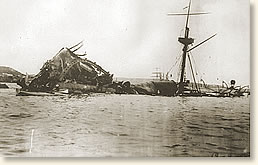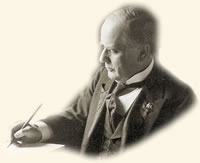|
The United States Declares
War on Spain, 1898
America's short war with Spain in 1898 was the nation's first step on the pathway to becoming a world power. The U.S. victory brought with it the unintended possession of the Philippines and a vested interest in the politics of the Pacific region that would ultimately lead to conflict with Japan. As an immediate outcome of the war, America found itself embroiled in an insurgency in the Philippines that closely mimicked the conflict in Vietnam over 60 years later. (see "Firefight, 1899").
 |
| The Wreck of the Maine |
Cuba, a Spanish colony, had been in rebellion since 1895. The brutal Spanish response turned American sympathies to the Cuban insurgents. The US Battleship Maine arrived in Havanna Harbor in January 1898 with a dual mission - to protect American interests and present the Spanish with a show of force. At 9:40 PM on the evening of February 15, an explosion ripped the forward hull quickly sending the ship to the bottom of the harbor, killing two hundred sixty-six of the 345 crew members.
Investigations started immediately. A US Naval Board of Inquiry attributed the sinking to an external explosion - a conclusion interpreted by many as referring to a mine placed beneath the ship. The finger of blame pointed to Spanish treachery.
An anti-Spanish press - particularly the "Yellow Journalism" of the Hearst and Pulitzer newspapers - enflamed American public opinion and raised it to a war-fever pitch. Congress clamored for action. President McKinley reluctantly succumbed to pressure and asked Congress to declare war on April 21. Congress obliged on April 25, 1898.
The war lasted only 3 months and cost the U.S. about 400 killed or wounded. The United States gained the Philippines, Puerto Rico and Guam and emerged as a power to be reckoned with on the world stage. Cuba gained independence from Spain. For Spain it was a humiliating defeat. Both her Atlantic and Pacific fleets were sent to the bottom of the sea and with them went Spain's prestige as a world power.
The sinking of the Maine put tremendous strain
on President McKinley. The national press clamored for war while Congress pressed
for action. Concerned that the nation's military was unprepared, McKinley
hesitated.
H.H. Kohlsaat was Editor of the Chicago-Times Herald and a confidant of President McKinley. In early April 1898 he was traveling east by train when he received a telegram from the President's private secretary informing him that the President wished to meet with him. We join his story as he receives a second telegram inviting him to dinner at the White House:
"At Harper's Ferry a telegram invited me to dine with the President and Mrs. McKinley. My train was two hours behind time, making it too late for dinner. So I wired that I would come as soon as possible.
There was a piano recital in the Blue Room of the White House. Mrs. McKinley was seated near the pianist, looking very frail and ill. The President was in the centre of the room on an S-shaped settee. There were eighteen or twenty guests present. As I stood in the doorway some one said: 'The President is trying to catch your eye.' He motioned me to sit by him, and whispered: 'As soon as she is through this piece go and speak to Mrs. McKinley and then go to the Red Room door. I will join you." I did as requested, and when he had shaken hands with some of the late arrivals we went into the Red Room. We sat on a large crimson-brocade lounge. McKinley rested his head on his hands, with elbows on knees. He was in much distress, and said: 'I have been through a trying period. Mrs. McKinley has been in poorer health than usual. It seems to me I have not slept over three hours a night for over two weeks. Congress is trying to drive us into war with Spain. The Spanish fleet is in Cuban waters, and we haven't enough ammunition on the Atlantic seacoast to fire a salute.'
He broke down and cried like a boy of thirteen. I put my hand on his shoulder and remained silent, as I thought the tension would be relieved by his tears. As he became calm, I tried to assure him that the country would back him in any course he should pursue. He finally said:
 |
| President McKinley |
'Are my eyes very red? Do they look as if I had been crying?'
'Yes.'
'But I must return to Mrs. McKinley at once. She is among strangers.'
'When you open the door to enter the room, blow your nose very hard and loud. It will force tears into your eyes and they will think that is what makes your eyes red.' He acted on this suggestion and it was no small blast.
After the musicale the President and I went into the old cabinet room and talked until very late.
A few days afterward Congress voted to put $50,000,000 in McKinley's hands-with no string on it. War was declared April 21, 1898.
Ten days later, May 1, 1898, the battle of Manila was fought. I visited the President a few days after the victory. McKinley said: 'When we received the cable from Admiral Dewey telling of the taking of the Philippines I looked up their location on the globe. I could not have told where those darned islands were within 2,000 miles!' Some months later he said: 'If old Dewey had just sailed away when he smashed that Spanish fleet, what a lot of trouble he would have saved us.'"
References:
H.H. Kohlsaat's eyewitness account appears in Kohlsaat, H.H., From McKinley to Harding (1923); Freidel, Frank, The Splendid Little War (1958); Rickover, H.G., How the Battleship Maine was Destroyed (1976).
How To Cite This Article:
"The United States Declares War on Spain, 1898," EyeWitness to History, www.eyewitnesstohistory.com (2005).
|






